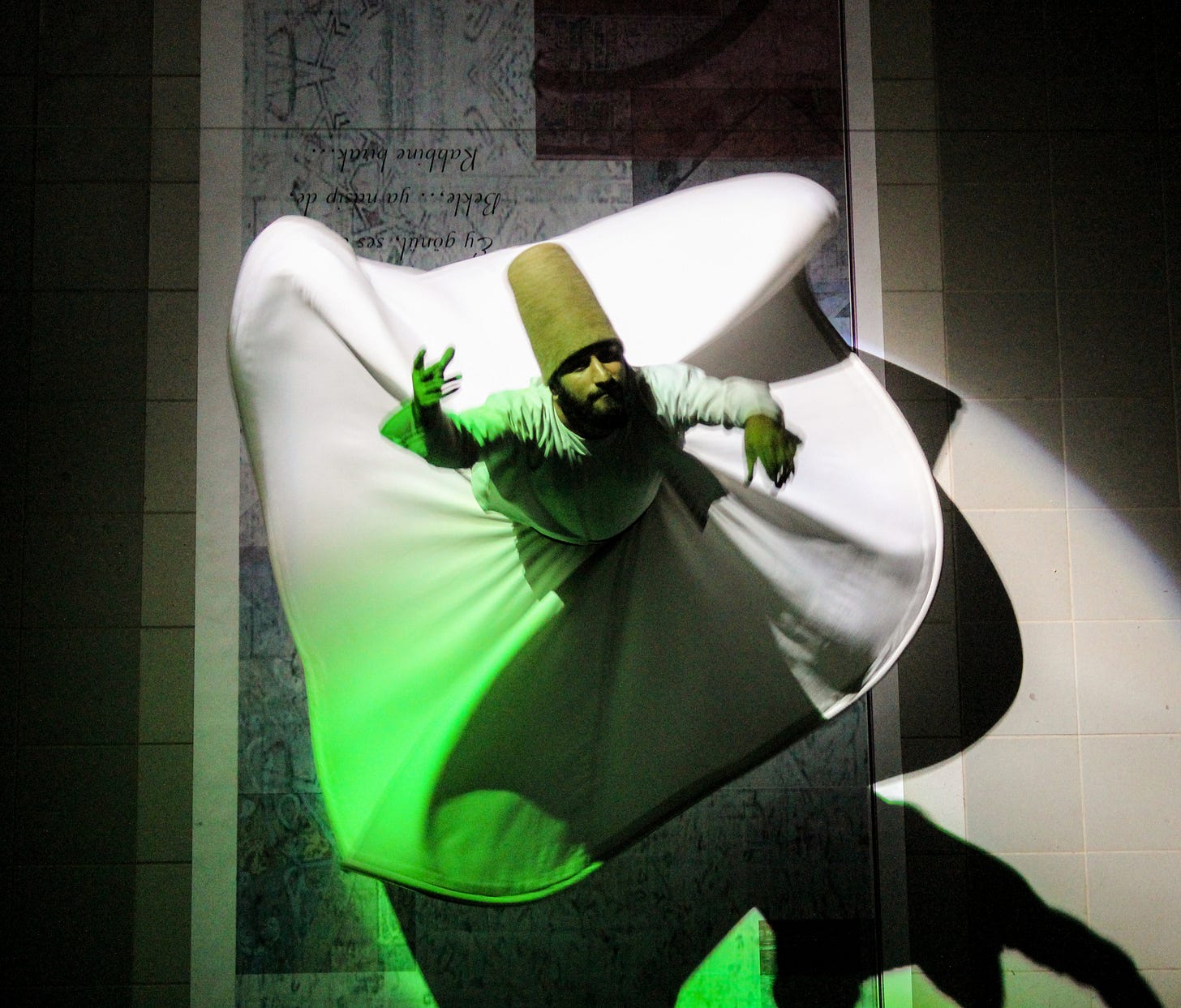A Heart To Touch the Sky
Mystic Whirling and the Musings of Rumi
Dancing with the Dead
When I was sixteen years old, I got to see the Grateful Dead and Bob Dylan perform at Candlestick Park in San Francisco’s Bayview Heights neighborhood. These were the halcyon days of my youth, where too much homework and lack of funding for the copious amount of CDs I wanted were my biggest problems. The world seemed to stretch before me in an endless horizon of possibility.
There was a glorious freedom that my circumstances generated and an easy openness to experiences that would enhance my life and make me joyful. This was the backdrop to a moment I had listening to the music. My friends were hungry and had wandered off in search of munchies while Jerry and the boys launched into “Playing in the Band” — one of my favorites.
Somewhere in the psychedelic jam section of the tune, with Jerry’s off-balance and hesitating guitar phrasing and the tribal, mystical, duel attack of drummers Bill and Micky, I went into a different (non-drug-induced) state of consciousness that was characterized by the desire to jump up and down by myself for what seemed like an hour. These two elements, music and motion, generated something ineffably powerful in me, and though it has no name, I suspect that “transcendent” is the best description we have.
Rumi’s welcoming philosophy
Recently, an inspiring article detailed an Israeli delegation of scholars and reporters visiting the “The Night of the Union” ceremony in Konya, Turkey. This is an annual ten-day celebration of Rumi—the Islamic mystic and poet. Rumi was a very ecumenical teacher who welcomed all sincere seekers; as the article details, he was wont to say:
“Come, come, whoever you are. Wanderer, worshiper, lover of leaving. It doesn’t matter. Ours is not a caravan of despair. Come, even if you have broken your vows a thousand times. Come, yet again, come, come.”
Rumi was said to have originated a form of Sufi worship called Sama that features graceful white-robbed, red-hatted dancers who spin in circles. Colloquially, these dancers are known as “Whirling Dervishes.” The goal of the dance is to divest the dancers from their egos and, in so doing, allow for a space to open that connects the dancers with the Infinite or God.
The Arabic word Sama is the same as the Hebrew Shema—both of which mean “to hear.” The Jewish meditation known as “The Shema” has the same goal of attainment of a deep state of awareness of the fundamental unity of all people and all things with the Infinite. In Sama, we again have music and motion, with the added benefit of a specific meditative purpose and a goal to pursue.
The prayer of the spinning mystics
The article goes on to detail the specific intention of the Dervishes. Turkish Mevlevi Dervish Osman Sariaj explains that:
Despite seeming like an ecstatic dance to the untrained eye, those who practice Sama describe it more as a prayer that requires a great level of self-discipline and control.
“Many people today know Sama as a dance, as a show, but it’s not. It’s a prayer; it’s the remembrance of God.”
Sariaj says the unique position whirling Dervishes put themselves in during the ceremony – holding one hand toward the sky and the other toward the ground while tilting their head sideways – reflects its meditative and religious purpose.
“All people want something from God. We also want something. But we don’t look at what he gives us. Our head position means that we don’t look up or down. The other hand is pointed down; we’re not looking at what we give others as well. We only look toward our hearts, inward,” he says, reiterating Rumi’s saying: “Only from the heart can you touch the sky.”
I now realize that my wild leaping at the Dead show was also a form of prayer—my heart, body, and soul reaching for the sky—for reasons I didn’t understand or even try to. This is something that virtually everyone has experienced at some point in their lives—the inexplicable and otherworldly sense of peace and joy we have when music and motion combine in just the right way. What might our lives look like if we could harness these experiences and make use of them on a day-to-day basis?
“Come, come, whoever you are.”





